By Shkëlqim ABAZI
Part six
SPAÇI
– The Grave of the Living –
Tirana, 2018
(My own and others’ memoirs)
Memorie.al / Now in my old age, I feel obliged to confess my truth, just as I lived it. To speak of the modest men, who never boasted of their deeds, and of the others whom the regime silenced and buried in unnamed graves? In no case do I take upon myself to usurp the monopoly of truth or to claim laurels for an event where I was only accidentally present, although I desperately tried to help my friends, who tactfully and kindly avoided me: “Brother, open your eyes… don’t get involved… you have only two months and a little left!” A worry that clung to me like an amulet from the morning of May 21, 22, and 23, 1974, and even followed me in the months that followed, until I was released. Nevertheless, everything I saw and heard during those three days, I would not want to take to my grave.
Continuation from the previous issue
“We sat down in the chairs, lit a cigarette each and talked a lot (of things), he promised me that the matter/work would get underway. When we parted, I sang the song with great delight: ‘Oh, this prison of Korça, with seven flights of stairs, Riza, my mother’s son, locked in the prison! / Who makes your bed, who throws your quilt, Riza, my mother’s son, locked in the prison! oi-oiii’ / ‘The debts are over, I met my brother, Riza, my mother’s son, locked in the prison! / But Kamenica waits with tears and longing, Riza, my mother’s son, locked in the prison! oi-oiii, etc.’
I sang it, I threw it out, and I made an iso (backing harmony) myself, and I returned to the cell extremely cheerful/drunk. The policeman turned out to be a fellow villager, whom we knew since childhood, he was a bit simple-minded, but his mouth was like a pepper (very sharp/talkative). When he saw me overjoyed, he was surprised, but accustomed to prison tricks, he answered me with a song:
‘Oh poor Zake, did you get a ‘kërriç’ (something small, maybe a message/favor), your ass in the cell and your mind in Kamenica. / No pan (saçi) or pot will cook for you, because the bitter flour bursts in the capicë (basket/pile), oi-oiii’.
It was true, I had become like bitter flour, and my blood was embittered, so much so that even a basking viper would die on the spot if it bit me. When he heard the song, he took me for someone gone mad, and he wasn’t wrong, but I was also flying high because my friend from youth had raised my hopes.
Days passed and blood flowed, water flowed and no work at all, the craze left me, boredom gnawed at me.
“How could my friend not remember what he had left and said, and thrown stones behind his back? I felt they had completely deserted me. But one Sunday (as I heard the policemen, because I had lost track of time), they put the handcuffs (‘the German ones’) on me and took the stairs up to the second floor.
“They are treating me so well; it seems my friend has finished the job!” – I realized and dragged the policemen who were holding me by the arms.
‘What are you enduring that you knocked us down, you mule!’ – complained the one who had sung the song to me. ‘After five minutes, will you sing me the song you sang the other day when you escort me?’ – I thought I was on the verge of release.
‘I will sing you the song of Xhebrail (Gabriel/Angel of Death), you donkey Zake!’ – My fellow villager burst out and added: – ‘I sang to you only once, but this one will sing to you for a lifetime’ (kuluvallanë – slang/colloquial for ‘forever’ or ‘the big one’)!
I didn’t pay attention, but walked on without knowing where to stop.
‘Here, you mule, and strengthen your back immediately!’ – And he knocked on a door.
‘Come in!’ – A voice was heard.
We entered a room where three men were sitting at a table. The policemen shoved me onto a concrete chair.
‘Hello!’ – But no one answered me.
‘Get out!’ – They ordered the policemen.
“I succeeded immediately!” I could barely wait for the moment of release.
‘What have you done, Riza? You have stunk up the world, Riza! How could I not have known you, Riza! You were a cinder under the ashes, Zake! You almost burned us, Zake! But immediately you are stuck in the dirt, Zake! And you can’t move your ass from me, Zake!’
The outburst caught me off guard, so much so that my mind got blocked.
‘The infidels have lied to you, Nevzatkë!’ – I tried to explain myself.
‘Nevzatka is for your mother and your father! Who gave you the name Nevzatka (mocking name/nickname), was it the diversants (saboteurs) you welcomed and sent off with bows and kept with food and drink, with meat and raki, with walnuts and apples? They filled your pockets with dollars and drachmas, and you pretended to labor! Accused Riza Kamenica, drop your pants and take out your guts (secrets/truth) for the Party, if you want to save your head!’ – He burst out nervously.
I didn’t know where to start the thread.
The interrogator truly accused me of words (gossip/talking), but he only barked (shouted/accused gently), while this one stuck me with crimes (palavira) that I had neither committed nor ever thought of.
I tried to soften him: – ‘The vagrants have deceived you, comrade Nevzat! Because by Allah, I have not committed any of these wicked acts that you are saying!’
‘Accused, leave the nonsense and get straight so you can have leniency, we know everything!’ – a fat man interrupted me and threw some papers on my lap. ‘Open your eyes (small eyes), read the black on the white (the written proof)! Add what you have to add and put your signature, so we can close the matter’.
Without even glancing at the sheets, I handed them back to the one who brought them to me.
‘I don’t know how to read them, man!’ (And I wasn’t lying, who knew how to write in our time?)
‘Yes, you do know, because we didn’t write those letters you sent to the diversants, did we?’ – The man with the papers burst out at me.
‘What diversants is he talking about, Nevzatkë, because I don’t understand anything at all!’ – I addressed my friend.
‘Nevzatka is for your mother and your father! Don’t you understand that you are accused as an enemy of the Party? Did the prosecutor tell you clearly, or should we turn it into Greek?’ – and he pushed me so hard that I fell from the chair.
At that moment, I remembered my oath at the beginning that I would not admit even if they cut my flesh with scissors.
When a bulky man grabbed me by the collar, he shook me by the neck so much that my eyes popped out and he roared:
‘Hey, did you hear? Now sign and get your ass out of here!’
‘Wait, because I truly don’t know (how to write)!’ – I defended myself.
‘We don’t give a damn that you don’t know! Put your finger on it and break your neck (go back) to the cell!’ – He took a bottle from under the table, but it slipped and splashed me head to toe with ink.
‘Read me what those papers say, man!’
‘Your evil deeds, may your mind be closed!’ – Nevzatka threatened me.
‘What evil deeds have I done, man?’
‘The ones you know!’
‘I don’t know anything at all!’ – I defended myself again.
‘Riza, shut that mouth and sign, because for the ideal… we won’t waste words with you!’ – my friend threatened me.
‘I don’t remember doing anything, not a single thing!’ – I replied curtly.
‘Is that so?’ ‘I will make you remember even the milk you drank from your mother!’ – He took out a chestnut stick from under the table and began to hit me where it hurts and where it burns, bam and bum, frap and frup, he knocked me to the cement, and kept hitting.
When he got tired, the other one took over. I don’t know how many sticks they broke on my back until I lost consciousness…!
They took one man from every village of the district, brought us to trial, gave us twenty-five years each, and brought us here, to split boards (work hard/suffer) with the savages of Mirdita!
This is the story of the stick, young man!” – Zakja ended his narration.
Prison Combinations
I spent the first week resting.
Osmani and Sefedin Juniku, somehow managed to write a report to Muhamet Kosovrasti, with which we presented ourselves to Medi Noku.
I had heard about the technical office chief’s mischief since Reps, but the friends there completed the information for me, and I was ready to face him.
Medi was cunning. He received us with a smile, but I threw the report on the table and followed Osmani, while Sefedini stopped to speak separately.
He caught up with us on the road and announced the “agreement”: “They appointed you underground. But these are the jobs here, my friend! Luckily (Mydebari – old Turkish word for ‘fortunately’), you are in the first zone, which is closer than the others!”
“Better than worse. After all, you are with our friends!” – Osmani supported him.
The first acquaintances introduced me to my peers, some of whom knew my name without having met me. Before I arrived, the prison radio had broadcast the news, so when we met, we were like old friends.
I used the “kavaleshincës” (rest/recovery period) days to get to know my future teachers, so I could restart my studies without losing time.
The day I put on my boots and set off for the gallery, Myslim accompanied me and instructed me:
“Keep your eyes open, because this is your first time in the mine. Luckily, you are with Jemin Bejko and Arshin Laraku, who know the underground. Especially Arshin, who has worked as a miner all his life,” – and he set off. – “Come; let me introduce you to them!”
The old friends mobilized their friends, who made the most favorable “combination” (arrangement) for the moment; they put me in a group with two wonderful men. Although my time there would not be long, from them I gained the lacking experience in underground work, as well as two marvelous friends.
Myslim stopped near the emulation stand, where Nuni was waiting, with two strangers.
“This young man has been assigned to you! Shkëlqim Abazi from…”!
“Forget the ceremonies, you Beast, we heard who he is!” – A curly-mustached man interrupted him.
“Arshin Laraku from Alarupi and Jemin Bejko from Mokrra – he introduced himself and his colleague with a smile. The other one, a bit older, with a brush mustache and good-natured, shook my hand so hard he almost broke it.
“May the mine be easy for you, my friend?”
After this wish, which I heard for the first time, he bid farewell to Nauni and Myslim, and we followed the line that dragged along the steep path (the path of Calvary), with the body (of the line) on the sharp slope and the tail (of the line) in front of our feet.
I passed the corner of the dormitory and faced the abyss that plunged underfoot, about fifteen meters down, at the end of the ravine, where bundles of thorns were entangled with brambles and wild roses, on the opposite banks, less than ten meters away, two guard towers rose high.
I looked over the bushes, but my sight could not penetrate the rocky plane. The mouth of the stream that joined the collector-brook resembled a well.
“Oh God, what an ideal place to escape on a rainy and stormy night!” – this idea consumed me and I froze in place.
(I don’t know how to explain it, telepathy, or what the hell else, the thought migrated from my head to the head of Myftar from Dibra, who hadn’t been arrested yet at that time, but two years later, he would escape right through that well-mouth that tempted me.)
‘Move from the spot, you are stuck like a stake, man!’ – A voice stung me from behind. – ‘It’s beautiful, but where are you going to go!?’ I sobered up.
I passed through the gate, trembling with fear, lest I had unintentionally let slip a word, or they had caught my thought, when the policeman roared:
“The ninety-seven (referring to a specific person/number).
With the idea of escape in “that ideal place” and “the ninety-seven” behind my back, I took the path that cut through the terrain, over some stairs eroded into the reddish tuff.
Across the brook, about twenty meters as the crow flies, some convicts were moving about, in front of two barracks similar to ours, who looked askance and threw insults:
“We dug the grave for the enemies, may you die in the mine, hopefully!”
This curse shook me: “They must be poor mentally ill people who insult fellow sufferers”? But the colleague in front of me brought me out of my stupor; he threw an insult at them and burst out: “Shut your hole, you immoral thieves!” – And he turned to me: – “Hang your bag; it’s a matter of ordinary criminals!”
I ran out of breath on the stairs, but I stopped before reaching the top and turned once more towards the ‘ordinaries’, who were exchanging words with others behind us, I cursed them and threw an insult at them too:
“May you be cursed, you filthy corpses!”
I remembered the “Golgotha” of Reps, which seemed like a flower compared to this abyss over a chasm. There, you truly trudged through mud and dust, but your foot rested firmly, whereas here, a moment of uncertainty could turn you into a cripple. I realized the difference between the residents of the town who neither cursed nor insulted, and these ordinaries who barked like hounds but couldn’t bite.
In any case, I will leave space for reflections in another chapter. We reached the auto-road, which was no different from others. It was about five meters wide and ruined by the weight of tens of tons of vehicles, which had amortized it to the point of destruction.
To the right, where the path joined the main road, a roadblock rose, with a barrier stretched over two rusty pipes, where two policemen alternated each other, while soldiers with machine guns and helmets on their heads strutted from the guard towers.
We turned the other way, where we crossed a micro-bridge over the stream that bisected the valley, and after a few dozen meters, we found ourselves in an open space, the size of a basketball court, at the edge of which some barracks were erected, covered with cardboard.
I followed the guides to a door, where they handed me two grayish pebbles, with the smell of a restroom, which brought my guts to my throat. Their stench disgusted me so much that I threw them away as if they were two pieces of feces.
“What are you doing, my friend, why did you throw away the daily carbide ration?” – My colleague whispered in my ribs.
When I saw that they also gave him two or three pebbles similar to the ones I threw away, but he collected them with paper and stuffed them in his pocket, I bent down and picked up the pebbles again, not knowing how to proceed, until someone handed me a crumpled sheet of paper.
Further on, we faced another barrack, where a man with a missing limb handed me a metallic object, which he accompanied with a guttural voice: “The lamp!”
“Lamp or did my ears deceive me”?!
But the object did not resemble a lamp at all, at least not as I imagined it.
Nevertheless, I took it and followed the others, all eyes and ears, when they moved aside near the slope, unscrewed a stick with a hook at the top and folded a type of handle, fixed to two pegs, dividing the object into two almost equal halves. Then they rubbed the part with the handle against the stones or the wagon chassis, until a chalky mass, with a heavy stench, was detached from it.
I noticed that no one was upset, but they threw in a pebble beach, joined the two halves, tightened the screw and did something, or hit it with a hammer.
I imitated them, although this was the first time I encountered this tool , and then we entered that awful barrack where, apparently, there were clothes, because people were coming out transformed, one with a three-quarter length rubber coat and a miner’s helmet, the other holding it hung on his forearm, but in any case different from before. With the clothes they gave me, I moved aside and checked them one by one: a rubber coat and a cardboard cap, like a sort of leather (a kind of leather/material), with a net of straps inside.
Immediately, we found ourselves at the entrance of the black cave, where a stone wall continued deep inside with concrete pillars, packed one after the other, until they disappeared into the darkness. A pair of rails ran across the ceiling, on one side of which flowed a line of water, on the other, a narrow type of sidewalk, just wide enough for one person to pass.
Arshin was with us until the tunnel entrance; there he disappeared around the corner, from where he returned shortly with two hexagonal profile iron bars, which I heard them call crowbars.
In the square in front of the tunnel, about ten wagons with numbers were lined up, resembling a miniature train caravan. Jemini moved wagon number four near a stack of logs, selected about six or seven bodies (trunks/pieces of wood) and we loaded them into the bucket. Then he returned again, took out two thick sticks near a man’s height and as thick as an elbow, handed them to me and gestured for me to throw them into the wagon.
As soon as he finished with them, he approached the stream near the tunnel base, took out a conserve can from behind the reinforcement, filled it with water, and began to drain it into a hole, from which he had first unscrewed a threaded cap.
I imitated him, but my lamp released a vapor smelling like rotten eggs, the stench of which penetrated my nose and mouth, then into my lungs, provoking a gag reflex.
“What are you doing, man? This one has no carbide!” – My colleague snapped at me and grabbed me by the arm. Memorie.al




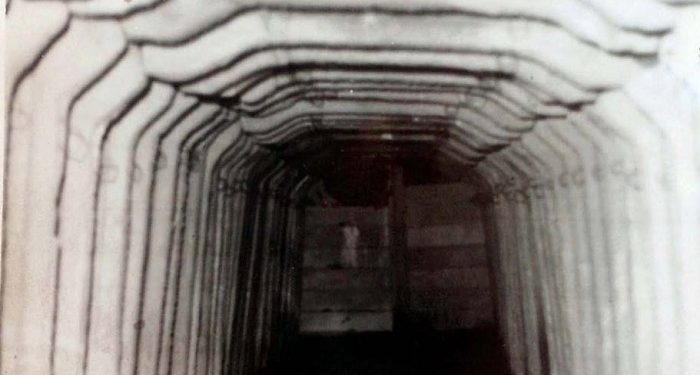
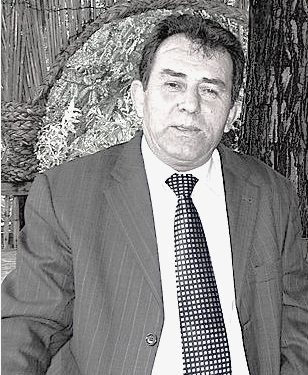
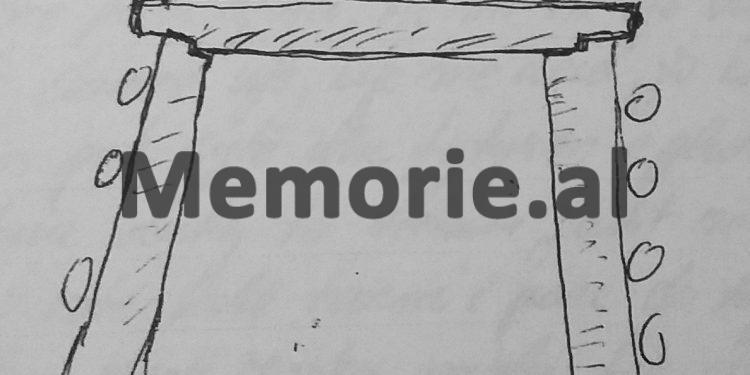
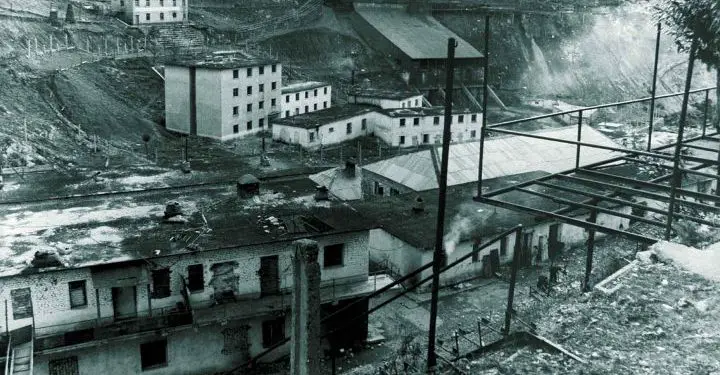



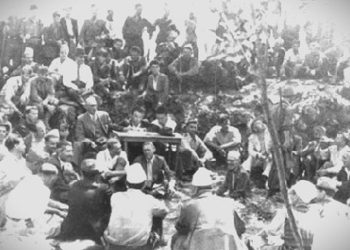
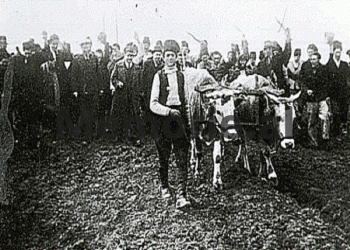
![“They have given her [the permission], but if possible, they should revoke it, as I believe it shouldn’t have been granted. I don’t know what she’s up to now…” / Enver Hoxha’s letter uncovered regarding a martyr’s mother seeking to visit Turkey.](https://memorie.al/wp-content/uploads/2026/01/Dok-1-350x250.jpg)
